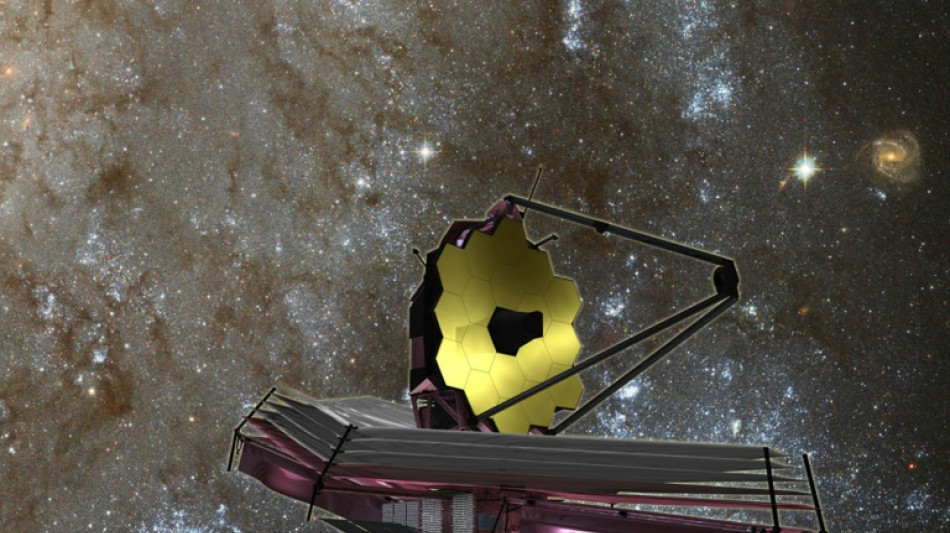
-
 Stocks rally as Trump comments ease Fed, China trade fears
Stocks rally as Trump comments ease Fed, China trade fears
-
Muzarabani takes six as Bangladesh set Zimbabwe 174 to win

-
 PM faces first test as Singapore election campaign kicks off
PM faces first test as Singapore election campaign kicks off
-
Patients with leprosy face lasting stigma in Ethiopia

-
 Still reeling a year on, Brazil's Porto Alegre fears next flood
Still reeling a year on, Brazil's Porto Alegre fears next flood
-
Lakers level NBA playoff series, Pacers and Thunder win again

-
 At night, crime and fear stalk DR Congo's M23-run areas
At night, crime and fear stalk DR Congo's M23-run areas
-
Embalming and make-up: Pope's body prepared for lying-in-state

-
 Prosecutors to make case against Harvey Weinstein at retrial
Prosecutors to make case against Harvey Weinstein at retrial
-
Coral reefs pushed to brink as bleaching crisis worsens

-
 Vietnam village starts over with climate defences after landslide
Vietnam village starts over with climate defences after landslide
-
'Happiness, love' at Moonie mass wedding after Japanese court blow

-
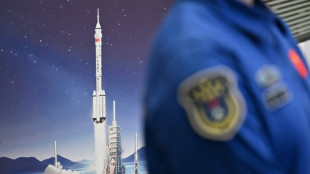 Veteran Chinese astronaut to lead fresh crew to space station
Veteran Chinese astronaut to lead fresh crew to space station
-
Pilgrims gather as Pope Francis begins lying in state

-
 Asian markets rally as Trump comments ease Fed, China trade fears
Asian markets rally as Trump comments ease Fed, China trade fears
-
Saudi 'city of roses' offers fragrant reminder of desert's beauty

-
 Trump says won't fire Fed chief, signals China tariffs will come down
Trump says won't fire Fed chief, signals China tariffs will come down
-
India hunts gunmen who massacred 26 in Kashmir tourist hotspot

-
 'No one else will': Sudan's journalists risk all to report the war
'No one else will': Sudan's journalists risk all to report the war
-
UK hosts new round of Ukraine talks

-
 Trial testimony reveals OpenAI interest in Chrome: reports
Trial testimony reveals OpenAI interest in Chrome: reports
-
Tokyo's newest art star: one-year-old Thumbelina

-
 Ronaldo hunts Asian Champions League glory in Saudi-hosted finals
Ronaldo hunts Asian Champions League glory in Saudi-hosted finals
-
Scientists sound alarm as Trump reshapes US research landscape

-
 Trump's return boosts Israel's pro-settlement right: experts
Trump's return boosts Israel's pro-settlement right: experts
-
Trump solo: first lady, children out of frame in new term
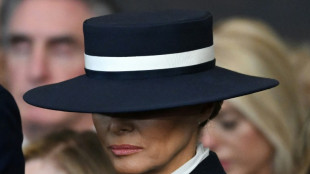
-
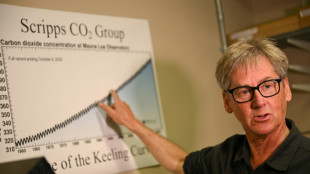 Climate watchers fret over Trump's cut to sciences
Climate watchers fret over Trump's cut to sciences
-
Moving fast and breaking everything: Musk's rampage through US govt

-
 'Everyday attack' - Trans youth coming of age in Trump's America
'Everyday attack' - Trans youth coming of age in Trump's America
-
A stadium and a jersey for Argentina's 'Captain' Francis

-
 New Trump task force vows to root out 'anti-Christian bias'
New Trump task force vows to root out 'anti-Christian bias'
-
96.com Congratulates Burnley FC on Premier League Promotion

-
 Auto Shanghai showcases new EV era despite tariff speedbumps
Auto Shanghai showcases new EV era despite tariff speedbumps
-
Trump's administration moves to scrap artificial food dyes
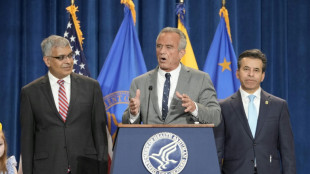
-
 Musk to reduce White House role as Tesla profits plunge
Musk to reduce White House role as Tesla profits plunge
-
US official backs off promise to solve cause of autism by September

-
 Guardiola joy as Man City go third after dramatic win over Villa
Guardiola joy as Man City go third after dramatic win over Villa
-
Trump says has 'no intention' of firing Fed chief
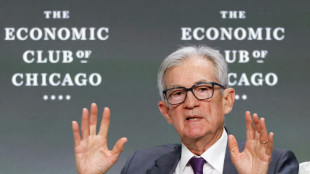
-
 Jury finds New York Times did not libel Sarah Palin
Jury finds New York Times did not libel Sarah Palin
-
UN appoints envoy to assess aid for Palestinians

-
 Celtics star Tatum 'doubtful' for game two against Magic
Celtics star Tatum 'doubtful' for game two against Magic
-
Former England star Flintoff reveals mental battle after car crash

-
 Defending champion Korda chases first win of season at Chevron Championship
Defending champion Korda chases first win of season at Chevron Championship
-
Olmo fires Liga leaders Barca past Mallorca

-
 Nunes strikes at the death as Man City sink Villa to boost top-five bid
Nunes strikes at the death as Man City sink Villa to boost top-five bid
-
Tesla says profits plunge 71%, warns of 'changing political sentiment'
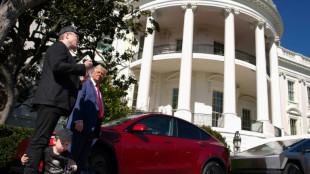
-
 WHO announces 'significant' layoffs amid US funding cuts
WHO announces 'significant' layoffs amid US funding cuts
-
PSG draw with Nantes to stay unbeaten in Ligue 1

-
 Trump's administration moves to ban artificial food dyes
Trump's administration moves to ban artificial food dyes
-
Gunmen kill dozens of civilians in Kashmir tourist hotspot


Webb spots surprisingly massive galaxies in early universe
The James Webb Space Telescope has spotted six massive galaxies that emerged not long after the Big Bang, a study said Wednesday, surprising scientists by forming at a speed that contradicts our current understanding of the universe.
Since becoming operational last July, the Webb telescope has been peering farther than ever before into the universe's distant reaches -- which also means it is looking back in time.
For its latest discovery, the telescope spied galaxies from between 500 to 700 years million years after the Big Bang 13.8 billion years ago, meaning the universe was under five percent of its current age.
Webb's NIRCam instrument, which operates in the near infrared wavelength invisible to the naked eye, observed the six galaxies in a little-known region of the sky, according to a study published in the journal Nature.
Two of the galaxies had previously been spotted by the Hubble Space Telescope but were so faint in those images that they went unnoticed.
These six new "candidate galaxies", so-called because their discovery still needs to be confirmed by other measurements, contain many more stars than scientists expected.
One galaxy is even believed to have around 100 billion stars.
That would make it around the size of the Milky Way, which is "crazy," the study's first author Ivo Labbe told AFP.
- 'Off a cliff' -
It took our home galaxy the entire life of the universe for all its stars to assemble.
For this young galaxy to achieve the same growth in just 700 million years, it would have had to grow around 20 times faster than the Milky Way, said Labbe, a researcher at Australia's Swinburne University of Technology.
For there to be such massive galaxies so soon after the Big Bang goes against the current cosmological model which represents science's best understanding of how the universe works.
"According to theory, galaxies grow slowly from very small beginnings at early times," Labbe said, adding that such galaxies were expected to be between 10 to 100 times smaller.
But the size of these galaxies "really go off a cliff," he said.
What could be going on? One suspect is mysterious dark matter, which makes up a sizeable amount of the Universe.
While much about dark matter remains unknown, scientists believe it plays a key role in the formation of galaxies.
When dark matter "clumps" together into a halo, it attracts gas from the surrounding universe which in turn forms a galaxy and its stars, Labbe said.
But this process is supposed to take a long time, and "in the early universe, there's just not that many clumps of dark matter," he said.
- 'Model is cracking' -
The newly discovered galaxies could indicate that things sped up far faster in the early universe than previously thought, allowing stars to form "much more efficiently," said David Elbaz, an astrophysicist at the French Atomic Energy Commission not involved in the research.
This could be linked to recent signs that the universe itself is expanding faster than we once believed, he added.
This subject sparks fierce debate among cosmologists, making this latest discovery "all the more exciting, because it is one more indication that the model is cracking," Elbaz said.
Elbaz is one of many scientists working on the European Space Agency's Euclid space telescope, which is scheduled to launch in July to join Webb in space.
Euclid's mission is to uncover the secrets of dark matter and dark energy -- and it could also help solve this latest mystery, Elbaz said.
Labbe referred to the "black swan theory", under which just one unexpected event can overturn our previous understanding -- such as when Europeans saw the first black swans in Australia.
He called the galaxies "six black swans -- if even one of them turns out to be true, then it means we have to change our theories."
K.Thomson--BTB


